Setting Goals to Overcome Injury
Have you ever struggled with injury?
Been upset, frustrated, angry, unable to keep it together through your rehab?
Did you think you’d never be able to play at the level you were before your injury?
Have you expected your rehab to go a certain way, and then it didn’t?
Teddy Bridgewater, a current quarterback for the New York Jets suffered a gruesome knee injury on August 30th, 2016. A torn ACL and a dislocation.
Many thought his career was over.
“It was scary,” Bridgewater said.
Bridgewater’s recovery has been a long road. On November 12, 2017 he was able to dress in his uniform and stand on the sidelines for the first time since his injury.
That was over a year rehabilitating.
The quarterback commented on being able to stand on the field again.
He said: “It brought tears to my eyes because it showed me you’re never out of it, you’re never out of the fight.”
In the 2018 season, Bridgewater has an opportunity to earn the Jets’ starting position, or he could be trade bait in the preseason. He doesn’t look ahead though, instead, focusing only on minicamp right now.
Bridgewater stated: “I have a list of small goals. I’ve been checking them off the list.”
Injury can bring many challenges, both physical and mental. The severity of those challenges often dependent on the intensity of the injury.
Athletes will of course be limited in their physical ability, but they might also experience anger, frustration, sadness, fear, feelings of loss, and a decreased self-confidence and self-esteem.
For some athletes, injury and recovery can resemble the bereavement process.
During college, I (Dr. Megan) suffered an injury that kept me out for an entire year, a regular and spring season.
I experienced all these emotions and endured additional challenges.
More so, I struggled to return mentally, having a fear of reinjury, lacking trust, and not being confident in my ability.
As a result, I didn’t return the player I was before my injury.
When you become injured in your sport, you want to rehabilitate your mental game along with the physical, so you’re able to return to your preinjury level.
Like Bridgewater, set small, manageable goals you can check off through your recovery.
Having attainable targets helps you focus on the process of rehabilitation and might also improve your confidence along the way, as you successfully complete your goals.
Also, eliminate your expectations through your recovery.
If you think you should return at a certain point or be the player you were before your injury, you’ll likely be frustrated if that’s not the case.
Bridgewater’s rehabilitation took well over a year, though he persevered through the process and remained optimistic through all obstacles.
To learn about how to stay focused during competition, check out “The Focused Athlete” audio and workbook program:
Related Sports Psychology Articles
- Sports Injuries Impact On Athletes’ Mind
- Mental Game Tips To Get Past Performance Slumps
- Using Your Mind to Mount a Comeback
*Subscribe to The Sports Psychology Podcast on iTunes
*Subscribe to The Sports Psychology Podcast on Spotify
Download a free sports psychology report to improve your mental game!
Learn more about our one-on-one mental game coaching.
The Focused Athlete

It’s probably no secret that you have many opportunities to become distracted in sports. Athletes are bombarded with both internal and external distractions everyday in practice and competition. Focused athletes are able to get the most from their skills because they are more efficient with practice and more concentrated in competition. Athletes who lack focus let distractions run wild through their mind and don’t know how to adjust or refocus.
The Focused Athlete was developed for any level coach, parent, or junior to professional athlete who wants to improve performance and gain a competitive edge. It does not matter if you are a fledgling junior athlete; or a seasoned professional, plagued with distractions; or you just wanting to learn how to improve concentration…
“The Focused Athlete” is a complete system to teach you how to focus like a champion and harness the power of a zone focus every time you step on the playing field, court, track, or course in practice and games!

